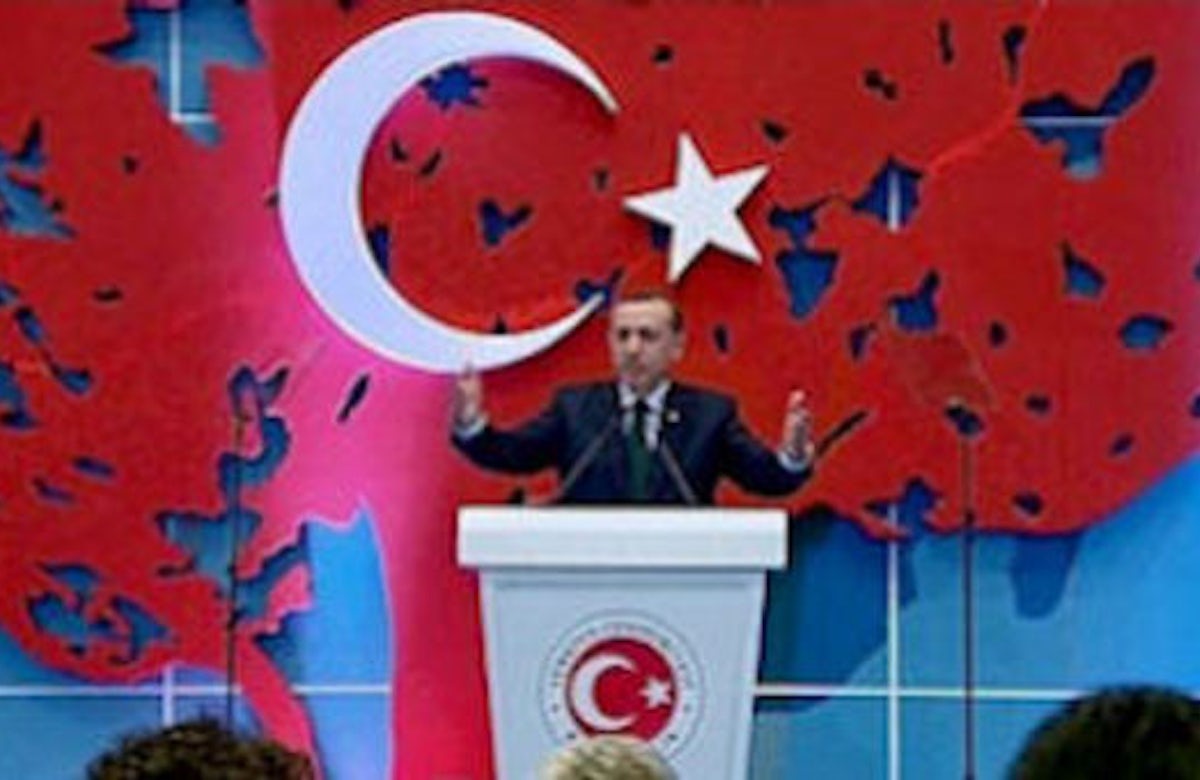Relations between Turkey and Israel have deteriorated rapidly due to Turkey's anger over Israel's refusal to apologize for the killing of nine IHH flotilla activists aboard the famous Mavi Marmara one year ago. The flotilla project was in effect an attempt to break the Gaza blockade, a persistent friction point between Turkey and Israel, quite separate from the demand for an apology.
.jpg) Today, the Turkish prime minister is scheduled to visit Egypt, perhaps followed by a trip to Gaza, as part of a larger plan to visit all the Arab countries involved in the Arab Spring, like Tunisia and Libya. Erdogan's strategy is clear: he is to lead the Arab world against Israel and shift the energies of the Arab revolutions to the conflict with Israel. He is seeking to exploit patronage over the Palestinian problem in order to advance the Turkish claim for regional leadership, or even to be once again recognized as a world power as in the glorious days of the Ottoman empire.
Today, the Turkish prime minister is scheduled to visit Egypt, perhaps followed by a trip to Gaza, as part of a larger plan to visit all the Arab countries involved in the Arab Spring, like Tunisia and Libya. Erdogan's strategy is clear: he is to lead the Arab world against Israel and shift the energies of the Arab revolutions to the conflict with Israel. He is seeking to exploit patronage over the Palestinian problem in order to advance the Turkish claim for regional leadership, or even to be once again recognized as a world power as in the glorious days of the Ottoman empire.
There exists a widespread conviction that Turkey is set to confront Iran over hegemony in the region. However, the facts on the ground do not sustain this claim, while Turkish policy on Gaza proves the opposite to be true. Issam Alayan, an Egyptian Muslim Brotherhood elder, suggested in the official website 'Ikhwan' that the Muslim Brotherhood wishes, once elected, "to convince Saudi Arabia and the Gulf not to be afraid of Turkey and the Persians who are all united by Islam as their conviction, culture and heritage, goals and joint interest."
Thus, the Brotherhood's position does not veer far from Erdogan's core policy of 'zero problems' with Iran and Syria. Consequently, the Turkish leader is furious with Syria's Bashar al-Assad, whose atrocities have put a damper on this policy and created tensions with Iran. He will try to re-launch a reconciliatory policy toward Iran in Cairo under the auspices of Egyptian and Muslim Brotherhood leadership; Alayan's article is evidence that his mission may succeed.
Why is Turkey so eager to placate Iran? While Erdogan's actions are ostensibly focused on the Middle East, their real target is Europe which, though never officially, has de facto denied Turkey membership in the EU. As part of Turkey's neo-Ottoman drive, the Middle East has become a mere strategic depth to serve it in its onslaught on Europe. Turkey's president Abdullah Gül already outlined what this onslaught would look like, when, in an address in Russia last weekend, he expressed "serious concern" for the phenomenon of "racism, Islamophobia and xenophobia" rampant in Europe.
Gül's address came on the heels of a 'mosques tour' by Turkish Foreign Minister, Ahmet Davutoglu, conducted during Eid al-Fitr-Bayram in the Balkans and Romania in order to revive the old Ottoman heritage in the lost European domains of the defunct empire. This may indicate that in the future, Turkey will claim the role of the protector of the migrants in Europe, where Turkish migrants predominate in what Gül defined as "aging Europe".
Turkey's need to placate Iran is based on the lessons of the neo-Ottoman philosophy drawn from the two historical failures to conquer Vienna in the 16th and 17th centuries. In both cases, the Ottoman armies had to retreat because the Iranian Safavites took advantage of the Sultan being away from the Persian border in order to threaten the Ottomans from the east. Dautoglu's "zero problems" policy toward Iran aims to convince it to delay any Sunni-Shiite quarrels in order to maintain unity in the face of a future large-scale conflict with the United States and Europe, though Iran is unlikely to allow Turkey to take the supremacy over the Middle East.
The same is true for Turkey's policy toward Hamas. It does not wish to rid Gaza of Iran's influence, but rather to establish a type of Turkish-Iranian coexistence as a precursor to future coexistence in other parts of the Middle East. Consequently, Erdogan's visit to Egypt is designed not only to advance the position of the Muslim Brotherhood, but also to encourage the pro-Iranian wing of the party.
Should Turkey succeed in its attempt to assume regional leadership and foster ties with Iran and Syria, Israel will not be the only state to suffer the consequences – the whole of Europe will be threatened.






